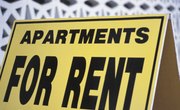
Snohomish County is home to more than 711,000 residents, as of 2010, and spans 2,090 square miles. Most of the county's population resides in the western half of the county, in cities such as Stanwood, Everett, Edmonds and Monroe. Rental properties are occupied by many Snohomish County residents, with landlords' and tenants' rights in Snohomish County being defined by the Washington State Legislature's Revised Code of Washington (RCW). Tenants facing eviction should know their rights under state law.
Rent Payments
A basic obligation of a tenant is to pay the required rent on time and in full, according to the terms of the lease agreement. Tenants should always retain a copy of the signed lease agreement in the event a conflict with the landlord should arise. If the rent is late by even one day, according to the Northwest Justice Project, the landlord has the right to evict the tenant. A three-day notice to pay or quit the premises is issued to the tenant requiring immediate payment. If the rent is paid in full within three days, the eviction process stops and the tenant has the right to remain in the rental unit. A landlord does not have to accept a partial payment of the rent.
Terms of Lease Agreement
Tenants also agree to abide by the terms of the rental or lease agreement when they sign the document and move in. This is why they should read all of the fine print on the lease and clarify its terms before signing the paperwork. Terms of the lease may include keeping unauthorized pets, exceeding the maximum number of occupants or smoking in the unit. If the landlord believes the tenant is in violation of the lease agreement, he can issue a 10-day notice to remedy the problem or face eviction. The violation must be fixed within 10 days; if it is, the eviction process must end.
Waste or Nuisance Violations
Some violations are classified by the Revised Code of Washington as "waste or nuisance" problems and may be cause for immediate eviction. Tenants may not intentionally destroy the rental unit or engage in activity that is hazardous to the physical safety of other persons on the premises, according to RCW 59.18. Gang-related activity, defined as activities that advance a gang's purpose, and drug-related activity are grounds for the landlord to issue a three-day notice to quit the premises, and the tenant does not have the right to stay and correct the problem, according to the Northwest Justice Center.
Eviction Process
Also known as an unlawful detainer process, the eviction process in Snohomish County is clearly defined in terms of tenants' and landlords' rights. Tenants must be given written notices in a legal manner and are allowed to have an attorney represent them if they wish. A summons is issued by the court and the tenant has the right to submit a Notice of Appearance and file an answer to the summons. If the eviction proceeds, eventually a sheriff may post a Writ of Restitution and escort the tenant from the premises. The landlord is not permitted to physically force a tenant off the property, according to the Northwest Justice Center.
References
- Northwest Justice Project: Tenants Rights in Washington State
- Snohomish County: About the County
- NOLO. "How Evictions Work: What Renters Need to Know." Accessed Aug. 13, 2020.
- MassLegalHelp. "When Can Landlord Evict." Accessed Aug. 13, 2020.
- VA Legal Aid. "Evictions (including Lockouts and Utility Shutoffs)." Accessed Aug. 13, 2020.
- Kreis-Enderle. "Evictions 101: Possession Judgments Vs. Money Judgments." Accessed Aug. 13, 2020.
- Pew. "How Free Legal Help Can Prevent Evictions." Accessed Aug. 13, 2020.
- Eviction Lab. "What Is the Eviction Process Like?" Accessed Aug. 13, 2020.
- Legal Aid of North Carolina. "Eviction Guide." Accessed Aug. 13, 2020.
- NOLO. "Tenant Defenses to Evictions in Virginia." Accessed Aug. 13, 2020.
- Harvard Law Review. "The Limits of Unbundled Legal Assistance." Accessed Aug. 13, 2020.
- Eviction Lab. Email. Accessed Aug. 13, 2020.
- Harvard. "Documenting the Long-Run Decline in Low-Cost Rental Units in the US by State." Accessed Aug. 13, 2020.
- Brookings. "Is the rent “too damn high”? Or are incomes too low?" Accessed Aug. 13, 2020.
- Govtrack.us. "H.R. 748: Coronavirus Aid, Relief, and Economic Security Act." Accessed August 14, 2020.
- CBPP. "Extend CARES Act Eviction Moratorium, Combine With Rental Assistance to Promote Housing Stability." Accessed Aug. 13, 2020
- CNBC. "Trump’s order does little to stop impending eviction crisis, experts say." Accessed Aug. 13, 2020.
- Urban Institute. "The CARES Act Eviction Moratorium Covers All Federally Financed Rentals—That’s One in Four US Rental Units." Accessed Aug. 13, 2020.
- Federal Register. "Temporary Halt in Residential Evictions To Prevent the Further Spread of COVID-19." Accessed Aug. 9, 2020.
Writer Bio
Michelle Hornaday lives in Edmonds, Washington and holds a Bachelor of Arts degree in English from Washington State University and a Master of Education from Northern Arizona University. She is currently a freelance writer for various websites.

